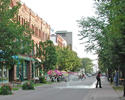As a professor who teaches about cities and the urban form, I very much appreciate the sidewalk ballets and street-corner societies that have historically existed in our nation’s urban centers. These features of the built-environment have long been powerful factors in the formation of both social capital, community, and a place’s identity. read more »
Suburbs
Be Careful When Citing Jane Jacobs: Her Conclusions Don’t Always Hold
- Login to post comments
Sydney High-Density Planning
High-density planning policies have become fashionable and Sydney planners are among the most enthusiastic adopters. New South Wales Government authorities claim that high density policies result in a reduction of greenhouse gas emissions (gge), provide improved housing affordability and result in reduced traffic congestion. No evidence has been provided to justify these assertions. Such claims need to be investigated as well as density’s detrimental effect on amenity and quality of life should also be investigated. read more »
- Login to post comments
Population Growth Concentrated in Auto Oriented Suburbs and Metropolitan Areas
The suburbs and exurbs continue to dominate population growth in the nation’s 53 major metropolitan areas, according to a City Sector Model (Note 1 and Figure 9) analysis. We traced growth between the 2010 Census and the American Community Survey 5-year data, from samples taken over the period of 2014 to 2018. The middle-year was 2016 (Note 2).
Population Growth by City Sector read more »
- Login to post comments
Immigrant Entrepreneurs Drive Main Street's Growth
In cities and towns in all reaches of America, businesses started by immigrants are critical pieces of the fabric of our economy and communities.
My children attend a Montessori preschool started by an Indian immigrant. Like many, she did not come to this country to start a business. But after multiple college degrees in the U.S. and some years working in corporate America, she opened her first Montessori school. Nearly 15 years later, she owns two schools, employs 100 women, and touches the lives of hundreds of students each day. read more »
- Login to post comments
California Preening: Golden State on Path to High-Tech Feudalism
“We are the modern equivalent of the ancient city-states of Athens and Sparta. California has the ideas of Athens and the power of Sparta,” declared then-governor Arnold Schwarzenegger in 2007. “Not only can we lead California into the future . . . we can show the nation and the world how to get there.” When a movie star who once played Hercules says so who’s to disagree? read more »
- Login to post comments
The Next Election Will Be Decided By the Suburbs
The fate of the 2020 election, whether for Congress or the White House, will be decided in the suburbs. Neither the pro-Trump countryside nor the intensely anti-Trump urban core have enough voters to put their preferred candidates in office.
It’s the suburbs that are home to the majority of all voters and over 80 percent of residents of the major metropolitan areas. read more »
- Login to post comments
Distribution of Transit Work Trips: Urban Core vs. Suburbs and Exurbs
Transit work trip ridership is strongly concentrated in the urban cores of the nation’s 53 major metropolitan areas (over 1,000,000 population), as is indicated by City Sector Model (Note). In the two urban core categories, the Urban Core: CBD and the Urban Core: Inner Ring, the share of total transit work trips is from four to six times the share of population (Figure 1) The percentage of transit commuters in the Urban Core: CBD was six times that of its overall metropolitan population share. read more »
- Login to post comments
Suburbia and the Black Experience
A couple weeks ago I was privileged to be the guest speaker at a wonderful event. The Cultural Inclusion and Diversity Committee of the Village of Hanover Park, a northwest suburb of Chicago, asked me to speak on the suburban black experience. It was part of a series the committee is conducting on the various demographic groups that make up their community. I had a wonderful time and I was honored to be invited. read more »
- Login to post comments
It's Organic! End of Conjecture and the Science Ahead
A long succession of urban theorists, including Jane Jacobs, have intuited, implied, or proclaimed the “organic” nature of cities. This organic concept of cities describes them as self-organizing, complex systems that might appear messy, but that disorderliness belies a deep structure governed by fundamentally rule-bound processes. read more »
- Login to post comments
New WPC Study: Expanding Seattle's Transit-Heavy Approach Will Not Improve Region's Quality of Life
Washington Policy Center asked national transportation expert and urban policy analyst, Wendell Cox, to evaluate transportation planning in the Puget Sound region. Where do people choose to live, where do they choose to work, and how do they choose to travel? Does our regional transportation plan and subsequent spending by public officials reflect reality, or wishful thinking? These were just a few of the questions I had for him. read more »
- Login to post comments






















